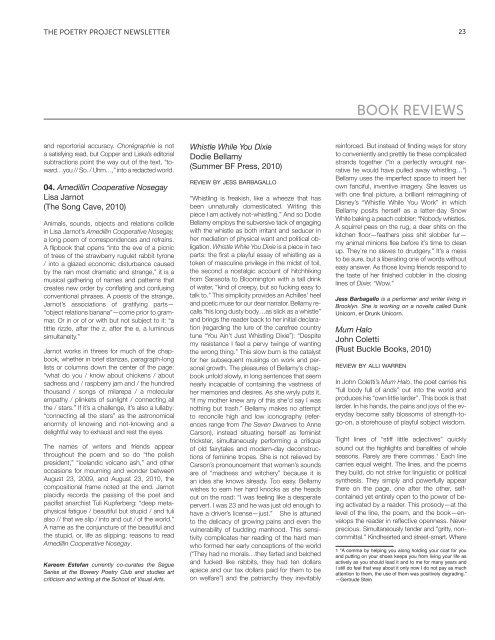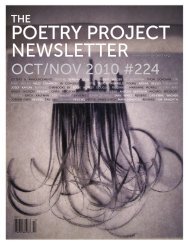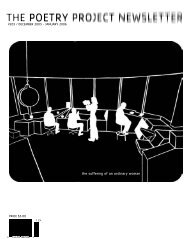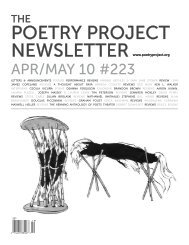Create successful ePaper yourself
Turn your PDF publications into a flip-book with our unique Google optimized e-Paper software.
THE POETRY PROJECT NEWSLETTER23BOOK REVIEWSand reportorial accuracy. Chorégraphie is nota satisfying read, but Copper and Liska’s editorialsubtractions point the way out of the text, “toward…you// So. / Uhm…,” into a redacted world.04. Amedillin Cooperative NosegayLisa Jarnot(<strong>The</strong> Song Cave, 2010)Animals, sounds, objects and relations collidein Lisa Jarnot’s Amedillin Cooperative Nosegay,a long poem of correspondences and refrains.A flipbook that opens “into the eve of a picnicof trees of the strawberry rugulet rabbit tyrone/ into a glazed economic disturbance causedby the rain most dramatic and strange,” it is amusical gathering of names and patterns thatcreates new order by conflating and confusingconventional phrases. A poesis of the strange,Jarnot’s associations of gratifying parts—“object relations banana”—come prior to grammar.Or in or of or with but not subject to it: “atittie rizzle, after the z, after the e, a luminoussimultaneity.”Jarnot works in threes for much of the chapbook,whether in brief stanzas, paragraph-longlists or columns down the center of the page:“what do you / know about chickens / aboutsadness and / raspberry jam and / the hundredthousand / songs of milarepa / a molecularempathy / plinkets of sunlight / connecting allthe / stars.” If it’s a challenge, it’s also a lullaby:“connecting all the stars” as the astronomicalenormity of knowing and not-knowing and adelightful way to exhaust and rest the eyes.<strong>The</strong> names of writers and friends appearthroughout the poem and so do “the polishpresident,” “icelandic volcano ash,” and otheroccasions for mourning and wonder betweenAugust 23, 2009, and August 23, 2010, thecompositional frame noted at the end. Jarnotplacidly records the passing of the poet andpacifist anarchist Tuli Kupferberg: “deep metaphysicalfatigue / beautiful but stupid / and tulialso // that we slip / into and out / of the world.”A name as the conjuncture of the beautiful andthe stupid, or, life as slipping: reasons to readAmedillin Cooperative Nosegay.Kareem Estefan currently co-curates the SegueSeries at the Bowery <strong>Poetry</strong> Club and studies artcriticism and writing at the School of Visual Arts.Whistle While You DixieDodie Bellamy(Summer BF Press, 2010)review by jess barbagallo“Whistling is freakish, like a wheeze that hasbeen unnaturally domesticated. Writing thispiece I am actively not-whistling.” And so DodieBellamy employs the subversive tack of engagingwith the whistle as both irritant and seducer inher mediation of physical want and political obligation.Whistle While You Dixie is a piece in twoparts: the first a playful essay of whistling as atoken of masculine privilege in the midst of toil,the second a nostalgic account of hitchhikingfrom Sarasota to Bloomington with a tall drinkof water, “kind of creepy, but so fucking easy totalk to.” This simplicity provides an Achilles’ heeland poetic muse for our dear narrator. Bellamy recalls“his long dusty body…as slick as a whistle”and brings the reader back to her initial declaration(regarding the lure of the carefree countrytune “You Ain’t Just Whistling Dixie”): “Despitemy resistance I feel a pervy twinge of wantingthe wrong thing.” This slow burn is the catalystfor her subsequent musings on work and personalgrowth. <strong>The</strong> pleasures of Bellamy’s chapbookunfold slowly, in long sentences that seemnearly incapable of containing the vastness ofher memories and desires. As she wryly puts it,“If my mother knew any of this she’d say I wasnothing but trash.” Bellamy makes no attemptto reconcile high and low iconography (referencesrange from <strong>The</strong> Seven Dwarves to AnneCarson), instead situating herself as feministtrickster, simultaneously performing a critiqueof old fairytales and modern-day deconstructionsof feminine tropes. She is not relieved byCarson’s pronouncement that women’s soundsare of “madness and witchery” because it isan idea she knows already. Too easy. Bellamywishes to earn her hard knocks as she headsout on the road: “I was feeling like a desperatepervert. I was 23 and he was just old enough tohave a driver’s license—just.” She is attunedto the delicacy of growing pains and even thevulnerability of budding manhood. This sensitivitycomplicates her reading of the hard menwho formed her early conceptions of the world(“<strong>The</strong>y had no morals…they farted and belchedand fucked like rabbits, they had ten dollarsapiece and our tax dollars paid for them to beon welfare”) and the patriarchy they inevitablyreinforced. But instead of finding ways for storyto conveniently and prettily tie these complicatedstrands together (“In a perfectly wrought narrativehe would have pulled away whistling…”)Bellamy uses the imperfect space to insert herown fanciful, inventive imagery. She leaves uswith one final picture, a brilliant reimagining ofDisney’s “Whistle While You Work” in whichBellamy posits herself as a latter-day SnowWhite baking a peach cobbler: “Nobody whistles.A squirrel pees on the rug, a deer shits on thekitchen floor—feathers piss shit slobber fur—my animal minions flee before it’s time to cleanup. <strong>The</strong>y’re no slaves to drudgery.” It’s a messto be sure, but a liberating one of words withouteasy answer. As those loving friends respond tothe taste of her finished cobbler in the closinglines of Dixie: “Wow.”Jess Barbagallo is a performer and writer living inBrooklyn. She is working on a novella called DunkUnicorn, er Drunk Unicorn.Mum HaloJohn Coletti(Rust Buckle Books, 2010)review by alli warrenIn John Coletti’s Mum Halo, the poet carries his“full body full of ands” out into the world andproduces his “own little larder”. This book is thatlarder. In his hands, the pains and joys of the everydaybecome salty blossoms of strength-togo-on,a storehouse of playful sobject wisdom.Tight lines of “stiff little adjectives” quicklysound out the highlights and banalities of wholeseasons. Rarely are there commas. 1 Each linecarries equal weight. <strong>The</strong> lines, and the poemsthey build, do not strive for linguistic or politicalsynthesis. <strong>The</strong>y simply and powerfully appearthere on the page, one after the other, selfcontainedyet entirely open to the power of beingactivated by a reader. This prosody—at thelevel of the line, the poem, and the book—envelopsthe reader in reflective openness. Neverprecious. Simultaneously tender and “gritty, noncommittal.”Kindhearted and street-smart. Where1 “A comma by helping you along holding your coat for youand putting on your shoes keeps you from living your life asactively as you should lead it and to me for many years andI still do feel that way about it only now I do not pay as muchattention to them, the use of them was positively degrading.”—Gertrude Stein
















